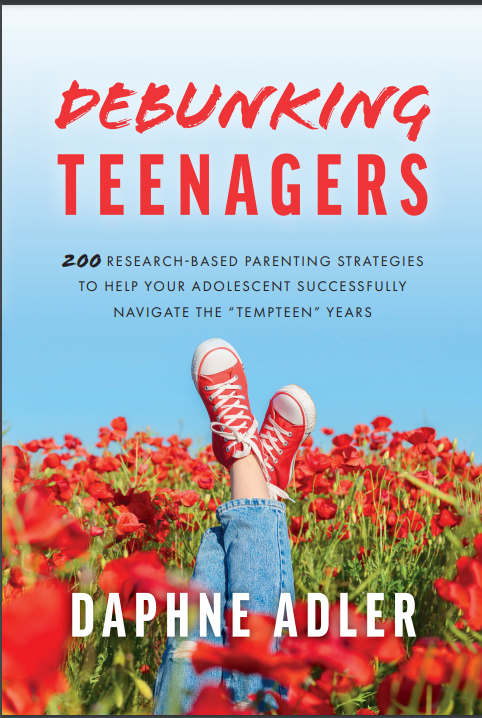






How to Make Your Teen into a Capable Young Adult
Want to make your teen into a capable young adult? Who doesn’t! The key may lie in remembering that teens have always BEEN capable young adults, ready to pitch in. What’s new is thinking of them — and treating them — as too burdened or threatened for us to rely on them. When a culture valorizes homework and safety at the expense of independence, it becomes harder for teens to get out there and show us what they’re made of.
That is unfair to the teens and to us adults, who end up spending more and more time catering to these capable young people when they’re ready to take the reins. So, happily, today’s post is an excerpt from “Debunking Teenagers: 200 research-based parenting strategies to help your adolescent successfully navigate the ‘tempteen’ years” by Daphne Adler Siniscalco. Daphne is a management consultant devoted to evidence-based recommendations. She enjoys applying these same skills to parenting! Her website is DebunkingTeenagers. (Note: In her book she supplies footnotes for all the facts below.)
DEBUNKING TEENAGE MYTHS
“We are men who still live at home. We’re not here to apologize about who we are. I’m looking around this table, hombres, and I see three winners, huh? And to every one of those out there who sees something different, I say bring it on, ’cause it’s gonna take a stick of dynamite to get me out of my parents’ house.” — 2006 Rom-com, Failure to Launch
As the twenty-first century progresses, more and more teens are “failing to launch,” or reach the classic milestones of independence that we used to take for granted. In 1998, close to half of American 16-year-olds had a driver’s license; by 2018, it was only a quarter. In 2006, the average college student communicated with a parent around 10 times per week; by 2013, this had climbed to 22 times, with students often initiating the contact.
In 1985, 45 percent of 20 to 22-year-olds were living with their parents; by 2003, it was 57 percent. And in 1982, just under half of young adults aged 23 to 24 were receiving financial assistance from their parents; by 2011, this figure had climbed to two thirds. In the words of one expert, “18-year-olds now act like 15-year-olds used to, and 13-year-olds like 10-year-olds. Teens are physically safer than ever, yet they are more mentally vulnerable.”
Do more responsibilities make teens more capable?
One theory offered up by pundits for why teens and young adults are less mature than they used to be is that parents are simply enabling their offspring to remain immature by failing to allocate them real-world responsibilities sooner. There’s no doubt that chores are in decline. In agrarian settings, the typical teen used to undertake 8 or more hours of household labor per day; the contemporary average in the US is 20 to 40 minutes. There has also been a shift within modern times: a study in Germany has found that teens now spend far fewer hours on housework than they did twenty years ago, and a survey of adults in the US found that 82 percent did chores themselves growing up, but only 28 percent have assigned chores to their kids.
From the perspective of developing skills, this modern freedom from chores should be a boon, as household work is typically repetitive and unchallenging for kids once they’ve mastered the tasks. However, it’s likely that by depriving them of responsibility, we’re doing our adolescents a disservice. Some studies have even suggested a relationship between chores as a child and effectiveness as an adult. For example, one study followed ~450 underprivileged boys from age 14 through to middle age and found that the best predictor of success as an adult was their capacity to work in childhood.
Short answer: Yes.
So there’s clearly only upside in encouraging our offspring to help more in basic ways around the house. Teens are perfectly capable of making the occasional dinner, and doing their own laundry if they want to have clean clothes; at the very least, they’ll know how to cook for themselves and operate the washing machine as and when they leave the nest.
It’s also worth stepping back to reflect that this is a problem of privilege. According to UNICEF, in the least developed countries, more than a quarter of children ages 5 to 17 are doing work that negatively affects their health and development. So please do remind your teen of this fact if there’s ever any muttering about taking out the trash.
Let Grow here: One of the easiest ways to make your teen into a capable adult — or your tween, or your sweet little elementary school child — is by gradually giving them more independence as they prove themselves responsible. Want to start, stat? Take our simple Pledge of Independence and we’ll send you one activity a week for 10 weeks that can inspire you to let go and…Let Grow! Or download our free “Independence Kit” here!


Daphne Adler Siniscalco



Our politicians are also legislating away the right to work for teens. My 14-year-old would LOVE to work, but no one will hire him because of a perceived state age restriction. Fortunately I own a business so I’ve put him on payroll for now.
In my youthful days, back in the 1940s-50s, we teens had jobs delivering newspapers, mowing lawns, working in farm fields, or at local businesses. Yes thins are different these days and many of those growth experiances are not available in today’s world. But understanding the parenting styles and principles of those days may be of value and guidance for finding Jobs available today that can build teen responsibility, character, and life skills. To study the practices of yesteryear read “Be Home by Dark” available at http://www.amazon.com/dp/B0B6Q8XCTZ. Kindle unlimited members read for free.
It’s true. I knew fourteen-year-old girls fifty years ago who were more mature than some thirty-four-year-old women I know now. Teenagers can handle a lot of responsibility. When my dad was seventeen he was on the crew of a U.S. Navy destroyer fighting WWII. When I was a kid I made my bed, washed dishes, did laundry, mowed the lawn, and went around the neighborhood (alone) doing chores to earn money. At fourteen I got my first real job, doing oil changes and other unskilled, dirty jobs in a motorcycle shop. And of course, like everybody else in the “old days” I was at the DMV on my sixteenth birthday to get my driver’s license, so I could drive my old stick-shift jalopy that I learned to work on myself. Teens, and even younger kids, do well with responsibility and autonomy. It makes them into better adults.
I’m well aware that I’m not liked here. Believe me when I assure you that I don’t care.
In defense of young adults living with their parents, today’s economy is a much more challenging landscape than when I was that age. College wasn’t nearly as expensive and much easier to pay off, and according to one online inflation calculator, rent prices have more than doubled while wages have barely raised a hair. Having lived in Latin America, where multi-generational living is more the norm, I can attest to the wisdom of the practice under the right circumstances – e.g. those young “failure-to-launchers” are holding down jobs and contributing to household maintenance and finances.